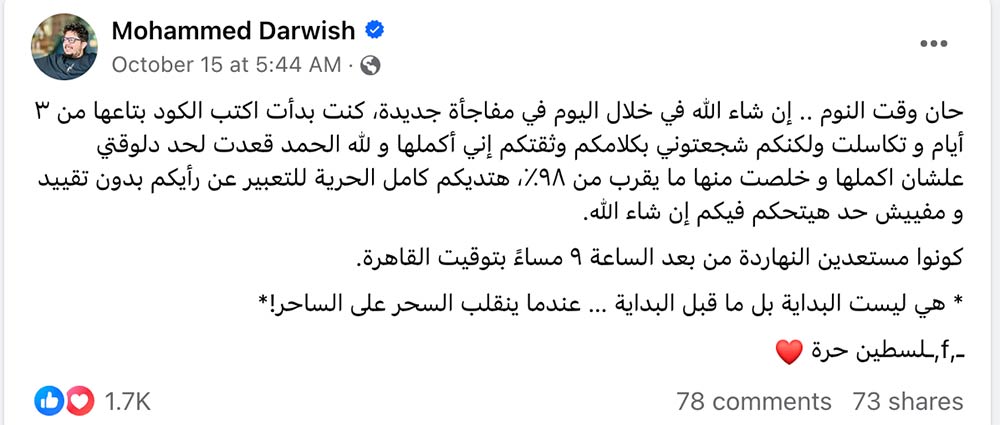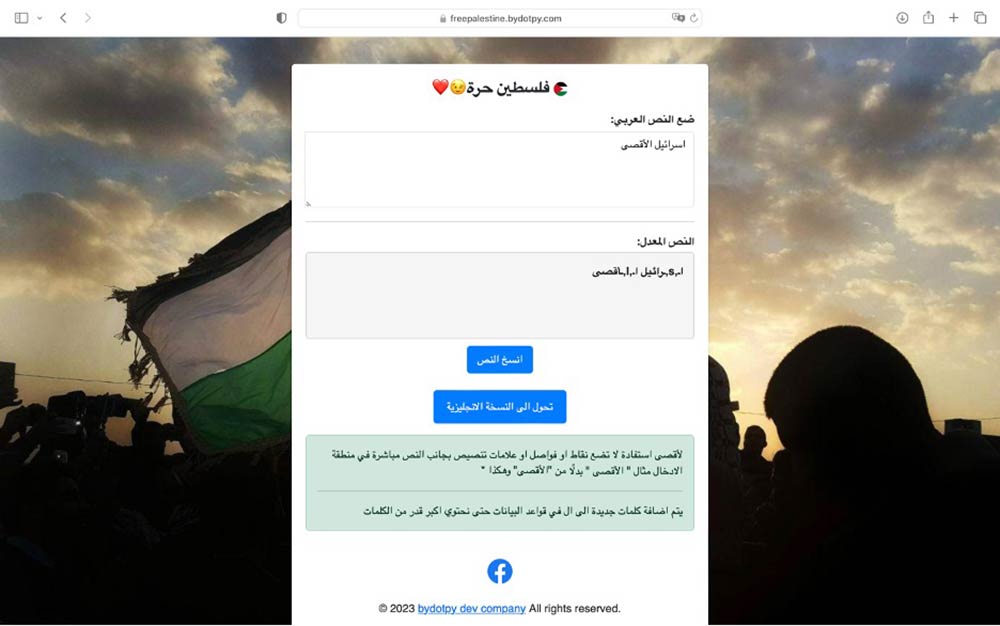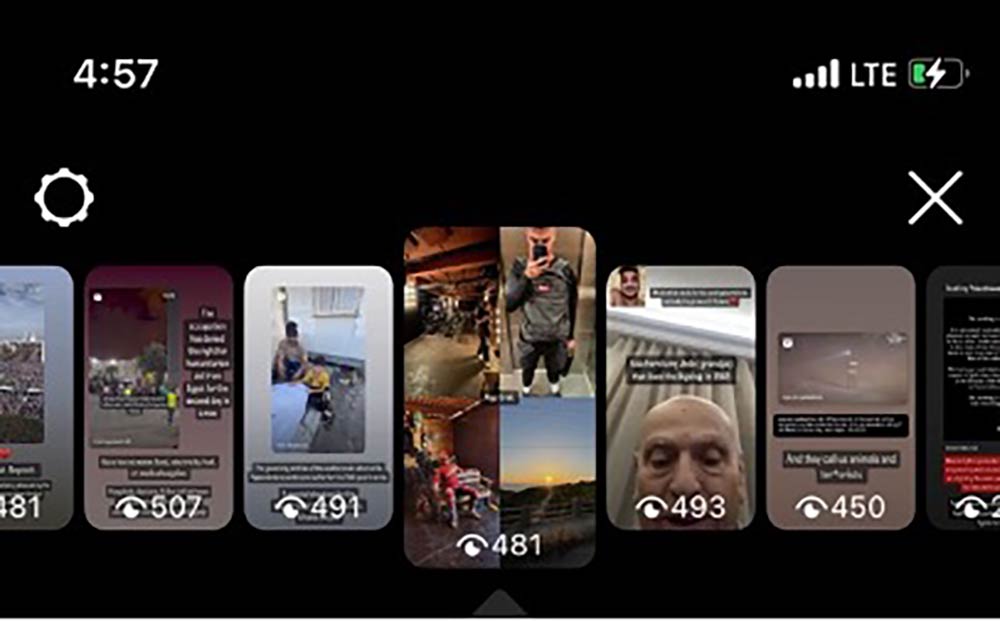Social media influencer Warde Bou Daher, a psychological specialist and social activist, says that her Instagram account is currently subject to a partial shadow ban.
With approximately 40,000 followers, Warde, who shares content primarily focused on mental health awareness, reveals that any of her posts discussing Palestinian history, the Israeli occupation, and those presenting statistics about the ongoing conflict are receiving significantly lower viewership than other content, even when posted simultaneously. These posts are seeing markedly fewer views, with videos that previously reached over 800,000 viewers now only garnering around two thousand. A notice on Warda Bou Daher's account indicates that it's restricted due to a violation of Meta's guidelines, leading to her content being shadow-banned, despite her attempts to navigate the algorithms.
In the midst of the ongoing war initiated by Israel against Gaza as a response to the "Al-Aqsa Storm" operation, social media platforms, including Facebook, Twitter, and Instagram, have become battlegrounds in an electronic war between activists and supporters of the residents of Gaza on one side, and those endorsing Israel and its war as a "justified reaction" on the other.
However, even in this virtual battle, both sides do not possess equal tools and resources. A substantial number of Meta platform users (Facebook and Instagram) complain of experiencing shadow bans.
A partial shadow ban is a form of control or censorship tactic employed by technology companies the own social media platforms like "Meta" and "X" (Twitter), as a restrictive policy, to limit access to specific information and posts.
A significant number of users on Meta platforms (Facebook and Instagram) are experiencing a shadow ban, or restriction of content. What is it, and how can we overcome it to speak about the Palestinian narrative?
In a conversation with Samar Al Halal, Head of Technology at SMEX (Social Media Exchange), she explains that Meta relies on a list of names, accounts, and words considered to be unsuitable for the company's policies and guidelines. So far, Meta refuses to disclose this list. This ban results in the deletion of thousands of posts, suspending or restricting accounts, disabling groups, lowering the views and engagement for high-impact accounts, as well as others who reshare this content. It also involves reducing interactions with the content and banning certain hashtags.
Organizations such as "SMEX", a non-profit organization dedicated to advancing and defending human rights in the digital realm within the West Asia and North Africa region, actively monitor these transgressions and engage with "Meta" and "X" regarding the violations. Samar Halal has said that there had been a complete lack of response from "Meta" and "X" regarding these infringements, pointing out that their internal policies and agendas do not align with the Palestinian narrative. Instead, they seem to benefit from suppressing this type of content.
In the aftermath of the Gaza conflict following the "Al-Aqsa Storm" operation, accounts sharing content related to the Palestinian narrative have been subjected to partial visibility blocks. The justification given is that these posts violate the company's content policies, while no equivalent restrictions are placed on posts promoting Western or Israeli narratives.
Before "Al-Aqsa Storm"
The banning and blocking is not a new practice by "Meta" against those opposing Israeli policies and its crimes against Palestinians. In 2018, Facebook shut down numerous accounts that had condemned the former US President Donald Trump's declaration of Jerusalem as Israel's capital. In this context, the Israeli Ministry of Justice disclosed that Facebook's management had responded in 2017 to nearly 85% of Israel's requests to remove and ban Palestinian content on the social media platform.
Conversely, during the protests against the forced eviction and displacement of Sheikh Jarrah neighborhood residents in 2021, Human Rights Watch documented what they described as the "unjustified removal and suppression of content published by Palestinians and their supporters." This content was critical of Israeli attacks on the neighborhood. As people turned to document these events, raise awareness, and condemn the forced eviction of Palestinians from their homes, this issue gained worldwide attention, with millions engaging with it.
In response to the global reaction through social media, the account of Jerusalem-based journalist Muna Al Kurd, a resident of Sheikh Jarrah neighborhood who had been documenting the forced evictions, was deactivated.
During that period, the Sada Social facebook page reported that they were able to "recover Twitter accounts that the center had reported as closed within the last 24 hours." This action was prompted by their active involvement in the 'Save Sheikh Jarrah Neighborhood' campaign, which encompassed over 70 accounts. These endeavors were part of the center's ongoing collaboration with various social media platforms to safeguard digital Palestinian rights.
After the "Al-Aqsa Storm" operation, the European Commission demanded that Meta and "X" remove "content deemed illegal" endorsing Hamas, or face sanctions. Failure to comply will result in EU-imposed fines reaching up to 6% of these companies' total sales
Following the "Storm"
In the aftermath of the "Al-Aqsa Storm" operation, the European Commission demanded that "Meta", the company that owns Facebook and Instagram, as well as "X" (formerly known as Twitter), remove "content deemed illegal", meaning content endorsing the Hamas terrorist organization, in accordance with the European Union's classification, or face sanctions, as reported by Reuters. Failure to comply with this request could result in EU-imposed fines, reaching up to 6% of these companies' total sales.
Thierry Breton, the European Union Commissioner, made statements on Tuesday, October 11, indicating that he had reason to believe that "X", formerly known as Twitter, was being utilized to disseminate unlawful content and disseminate false information within the European Union. In a direct message to Elon Musk, the owner of "X", he said, "I urgently call on you to ensure that your systems are effective and to report the necessary measures that you have taken."
Breton refrained from providing specific details about the misinformation he was referring to. In response to Breton's post, Musk stated, "Our company's policy is one of transparency and open-source information. Please list the violations you are hinting at on X so the public can see and evalaute them."
How do we evade the ban?
To outmaneuver these strict and unfair policies, experts from "SMEX" suggest several tactics for eluding the algorithms of these platforms, thus ensuring broader reach for posts. These tactics include:
Mentioning well-known figures and pages in posts, such as "Meta", "Instagram", "Mark Zuckerberg", and others, either in Stories or through hashtags on Facebook and "X".
Using stickers and audio clips on images to divert the attention of algorithms.
Integrating personal photos, selfies, images of pets, and scenic landscapes between Stories and Facebook posts.
Separating the letters of certain words and employing symbols like percentage signs, question marks, and exclamation marks in words that algorithms might flag and ban. For instance, writing "Isr@el" or "Isra?l".
Using Latin and foreign characters within the same word for terms deemed as prohibited, such as "shaهيed" or "shaهيد".
The utilization of Latin and foreign characters within the same word, especially for restricted terms like "shaهيد,"
Many activists have resorted to innovative and straightforward methods to outsmart algorithms and convey their support for Palestine. In this regard, Egyptian programmer, Mohamed Darwish, has developed a website that incorporates English letters and symbols into the very words users intend to post, effectively tricking the algorithms.


We spoke with some who have adopted these techniques, such as Danny from Lebanon, who recounted that his friends in Canada couldn't view his posts. Nonetheless, he successfully circumvented the algorithms by sharing personal photos that have seen interactions from followers. In a similar vein, Mohammad, also hailing from Lebanon, disclosed that attaching multiple Israeli flags to his Stories and then keep making them smaller in size until they disappear proved to be a successful ploy for sidestepping the algorithms and reaching a broader audience, particularly after he was facing a ban
With all the massacres committed by Israel, buoyed by social media companies to ensure that these war crimes never reach a global audience, our sole recourse is to seek out ways to break this silence, in the hope that the world will hear and bear witness
With all the massacres and war crimes committed by Israel in Gaza, buoyed by the support of social media companies in the virtual world, with the aim to ensure that Palestinians die in silence, and that these crimes never reach the global audience, our sole recourse is to seek out ways to break this silence, in the hope that the world will finally hear and bear witness.

Raseef22 is a not for profit entity. Our focus is on quality journalism. Every contribution to the NasRaseef membership goes directly towards journalism production. We stand independent, not accepting corporate sponsorships, sponsored content or political funding.
Support our mission to keep Raseef22 available to all readers by clicking here!
Interested in writing with us? Check our pitch process here!





